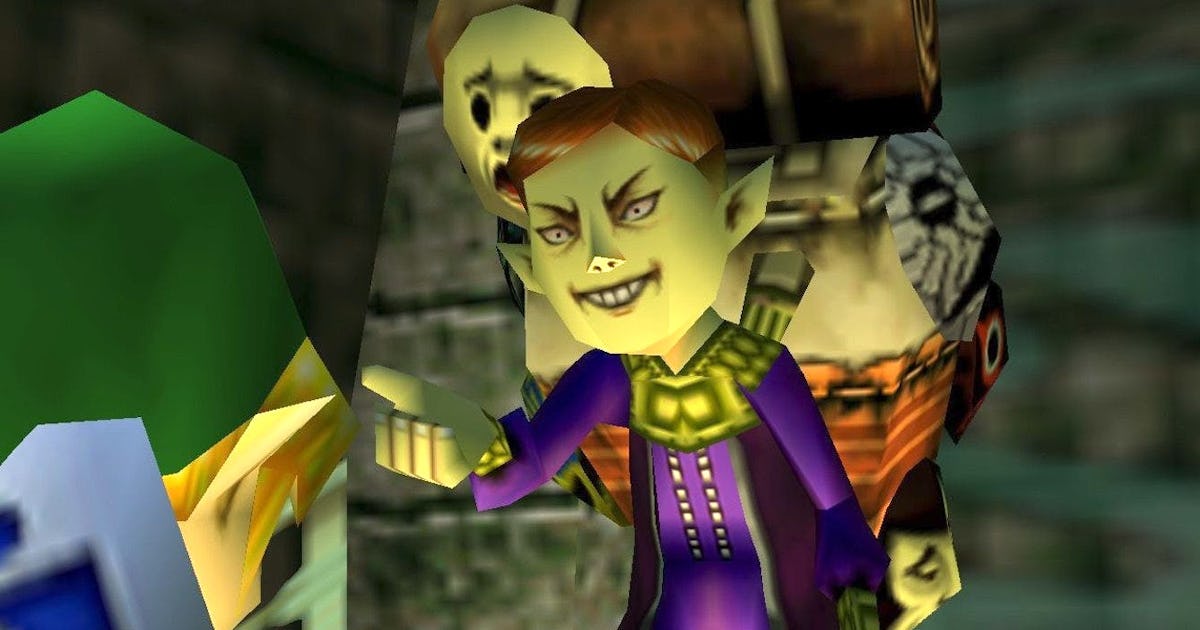
Stepping into the world of Majora’s Mask is like entering a kind of Zelda-inspired fever dream: a terrifying moon with a face looms in the sky, a strange hand sticks out of a toilet, and you’re stuck in an unending time loop that always ends in the apocalypse. While Ocarina of Time could easily be considered the greatest Zelda game of all time, Majora’s Mask is definitely the weirdest. Did you know that this brilliant title was just added to the Nintendo Switch Online library for subscribers?
Surrealism is at the core of Majora’s Mask, and there’s an air of horror and unease that permeates every single corner of the game. There’s no Ganon and no Hyrule this time around. The villain is an innocent Skull Kid that’s been taken over by an ancient malevolent being named Majora that inhabits a mask. Majora is a depraved entity that delights in causing destruction, and so he calls the Moon down to destroy the land of Termina in three days.
Majora’s Mask most prominent game mechanic is the time travel loop. You have three days (of in-game time) to do whatever you can, then you have to travel back to the start of the first day, which in turn resets everything in the world. There are a ton of mini plotlines that run through these different days, so you’ll need to reset countless times in order to see everything through.
There’s also one other major change in Majora’s Mask that puts a fascinating spin on the Zelda formula, which is the mask system. There are 24 different masks in the game, each with a unique effect. Three of these masks transform Link’s entire body. He can become a Deku Scrub, a Goron, and a Zora. The physiological abilities of each allow him to reach previously unlocked areas of the world. One of the game’s darkest twists reveals that the spirit of a dead person that Link meets resides within each mask. The animation when Link puts on one of these masks is total nightmare fuel as he doubles over in pain and we hear his bones crunching and reshaping.
The transformations add incredible variety to the overall world and dungeon design as each has a specific skill. Deku Link can burrow into flowers then shoot out and glide, Goron Link can turn into a ball and roll at high speeds, and Zora Link can freely swim and breathe underwater.
The other masks in the game serve various purposes. Some enhance Link’s abilities while others have one-off essential uses. For example, the Bunny Hood lets Link run and jump much faster, while the Stone Gibdo mask lets Link talk to Gibdo’s and forces nearby Redeads to dance. If you manage to collect all the masks, there’s also a fantastic reward that awaits you in the final boss battle.
The mask system is an inventive mechanic that makes Majora’s Mask feel unique, and this is on top of elements you’d expect from a Zelda game like different accessories, ocarina songs, and more. While Majora’s Mask’s unique gameplay elements make it stand out, arguably the story and setting elevate it enough that it’s easily one of Nintendo’s finest games ever.
The game is packed with other weird experiences, too. One moment you’re defending Romani Ranch from an alien invasion, and the next you’re healing someone’s mummified father. Each day in Majora’s Mask becomes a little more unsettling. The tempo of the town music increases with distorted notes and the people you meet throughout Termina despair more and more as apocalypse looms ever closer.
It doesn’t help that the Moon’s terrifying visage practically screams.
Majora’s Mask was released roughly a year and a half after Ocarina of Time, which means the development team re-used a lot of assets from the previous game. This leads to a Twilight Zone vibe as you see characters and models from Ocarina of Time put in unsettling new positions. It feels familiar but foreign all at once — like you’re trapped in a literal nightmare.
This is coupled with a variety of tragic stories present in the overall narrative like a couple finally reuniting in the final moments of the world, or a postman buying himself in his work to avoid confronting his own mortality.
Majora’s Mask is one of the most experimental Zelda games ever released, and it succeeds on nearly every level. When it was initially released Majora’s Mask was trapped in the shadow of Ocarina of Time, but over the years it’s carved out a niche and dedicated fan following.
Other games have tried similar time mechanics, but even after 22 years, there’s nothing else out there that compares to Majora’s Mask. It’s an experience that’s equally unsettling and engrossing. Now that it’s easier to access than ever before, it’s one that deserves to be played by every Nintendo Switch owner.